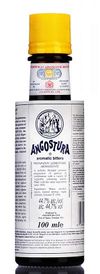Bitters: Difference between revisions
Jump to navigation
Jump to search
Uncle Jesse (talk | contribs) (Adding image. This page may be redundant. Or perhaps the page for Angostura Bitters is the redundant contendt. Maybe they should be merged.) |
Uncle Jesse (talk | contribs) No edit summary |
||
| (One intermediate revision by the same user not shown) | |||
| Line 1: | Line 1: | ||
[[file:angostura_bitters.jpg|thumb|100px|right|Angostura Bitters]] | [[file:angostura_bitters.jpg|thumb|100px|right|Angostura Bitters]] | ||
Generic description for concentrated bitter tincture of herbs, spices, [[ | Generic description for concentrated bitter tincture of herbs, spices, [[fruit]], and [[spirits]]. Deemed too bitter to be consumed by themselves, they are normally applied to beverages in dashes or small fractions of an ounce or milliliter. Though containing [[alcohol]] up to 80 [[proof]], manufacture was allowed without restriction even during [[prohibition]], because the bitterness was such that the Internal Revenue Service, who administered compliance with the National Prohibition Act, termed it "non-potable alcohol" ie, too bitter to consume straight. | ||
==Flavor== | ==Flavor== | ||
| Line 12: | Line 12: | ||
[[Category:Spirits]] | [[Category:Spirits]] | ||
Latest revision as of 00:21, 15 December 2022
Generic description for concentrated bitter tincture of herbs, spices, fruit, and spirits. Deemed too bitter to be consumed by themselves, they are normally applied to beverages in dashes or small fractions of an ounce or milliliter. Though containing alcohol up to 80 proof, manufacture was allowed without restriction even during prohibition, because the bitterness was such that the Internal Revenue Service, who administered compliance with the National Prohibition Act, termed it "non-potable alcohol" ie, too bitter to consume straight.
Flavor
- Bitter
- Herbal
- Spicy
- Cinnamon
- Clove
- Anise
